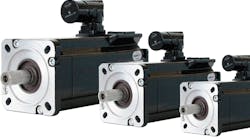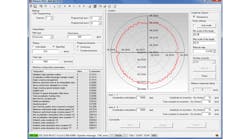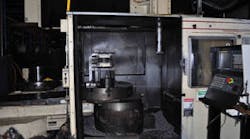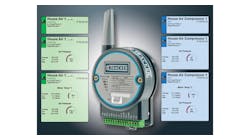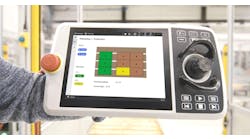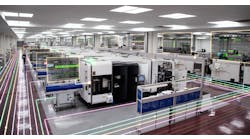NUM, the CNC automation group, introduced two series of brushless servomotor that it claimed will save on machine tool installation costs by eliminating the need for a separate encoder cable. Machine builders can use a single drive-to-motor cable for each motion axis, NUM pointed out, thereby reducing cabling, speeding up installation and commissioning, and improving system performance.
The developer estimated that for a typical high-end CNC machine installation involving 20 meter (65.6 ft) of cabling, the new technology can reduce total motor cabling costs by as much as 20 percent per axis.
Available in 75-, 95-, 126-, and 155-mm frame sizes and three different lengths, the new SHX and SPX brushless servomotors offer machine builders a wide choice of output power and speed ratings to match different machinery applications. Both motor ranges present high mass moments of rotor inertia, optimized for machine-tool feed axes, and combine dynamic performance with very smooth running, even at low speeds.
The SHX range is intended mainly for cost-sensitive applications and includes models with continuous torque outputs from 1.2 to 20 Nm. For applications that demand motors with maximum power-to-volume ratios and a high degree of protection (IP67), such as high-end machine tools, grinding machines, and robotics, the SPX range offers units with continuous torque ratings from 1.4 to 23 Nm.
Developed for use with the NUMDrive X digital servodrives and Flexium+ CNC platform, SHX and SPX brushless servomotors only require a single cable connection. An embedded digital interface scheme allows the encoder power and position feedback data – together with diagnostic information and thermal data from the motor’s temperature sensor – to be carried on just two shielded wires contained within the motor’s power cable. This approach has significant advantages for machine builders. In addition to lower cabling costs, cable chains are smaller and lighter, the onerous task of installing and debugging cable runs is much less time consuming, and the reduced number of interconnections improves reliability and immunity to electromagnetic interference.
All SHX and SPX brushless servomotors offer a choice of single- or multi-turn digital encoders with medium, 20-bit (1,048,576 positions per turn) resolution and plus/minus 60 arc-seconds accuracy. Backed by the precision control capabilities of NUM’s new Flexium+ CNC kernel, this level of encoder performance helps achieve very smooth interpolated move profiles and fine adjustment of speed.
Both encoders are available in safety versions too, which return position and redundant position data to the servodrive using a secure certified protocol, and comply with the EN 61800-5-2 functional safety standard to SIL 2. NUM is currently developing a range of high-resolution 23-bit digital encoders also, featuring an accuracy of better than plus/minus 45 arc-seconds, for applications demanding ultra precise positioning.
Designers implementing machine safety schemes gain considerable benefit from the tight functional integration of SHX/SPX servomotors and NUMDrive X servodrives. Each drive module can incorporate a variety of safe motion-monitoring functions, such as Safe Torque Off, Safe Stop 1 and 2, Safely-Limited Speed, etc, with all critical system operations overseen by a centralized safety PLC that forms an integral part of the Flexium+ CNC system. This modular approach is cost-effective, allowing high-integrity safety functions to be implemented on individual machine axes with minimal additional components.
As standard, SHX motors have varnish-impregnated housings with an IP64 rating, and their shafts are protected to IP54. The SPX motors feature a special corrosion-resistant coating, and both the housings and shafts have an IP67 rating. If even higher levels of shaft protection are required for applications involving direct exposure to fluids such as cutting oils, the motors can be pressurized by connection to a compressed air supply.
All SHX and SPX brushless servomotors are available with plain or keyed shafts, an optional electrically actuated permanent magnet holding brake, and a choice of stator winding configurations. Designed for use in ambient temperatures between 0 and 40 degrees Celsius, the motors can also be operated at up to 55 Celsius with appropriate power de-rating.
